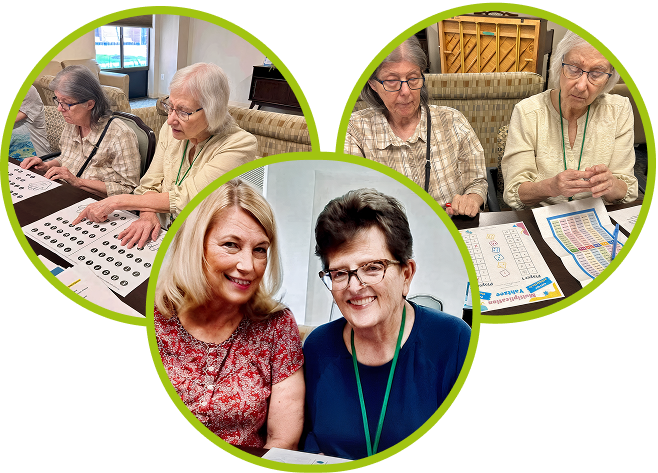Noticing the Early Signs of Memory Loss
It starts quietly. A name escapes you. A story loops. The keys show up in the freezer next to the peas. These moments can feel odd, even funny… until they start to feel familiar. When someone you love begins forgetting more often—or you find yourself doing the same—it’s natural to feel unsure. Is this just getting older? Or something more?
The truth is, occasional forgetfulness is common and rarely cause for alarm. However, when memory changes become more frequent or start affecting daily life, it’s worth paying closer attention.
These early shifts, as subtle as they may seem, are like whispers from the brain asking for care. By noticing them and responding with compassion, we can support brain health in older adults and shape a path forward rooted in connection and hope.
What’s Normal vs. What’s Not?
You mix up a name, forget what you came into the kitchen for, or reheat the same cup of coffee three times. These things happen to everyone sometimes. Usually they’re nothing more than proof that your brain is juggling a lot.
What’s different is when the forgetfulness becomes more than occasional. Like when you hear the same story three times in one conversation or Mom skips her beloved book club because she “just doesn’t feel up to it”. In these cases, it might be time to check a little deeper.
These signs don’t always mean something serious, but they do ask for attention. Have you seen shifts like this in someone close to you? If so, you’re not alone. Understanding what’s typical and what’s not is an important step toward offering support that’s both respectful and proactive.
Why Early Detection Matters
When memory starts to slip, it can feel unsettling for everyone involved. Early signs aren’t flashing neon warnings. They’re more like soft nudges. They’re the brain’s way of saying, “Hey, let’s not wait on this.”
The brain is most responsive when we meet it with care before deeper changes set in. That’s why it matters to notice. That’s why it matters to act.
Learning how to prevent memory loss in old age isn’t about fixing something broken, it’s about nurturing what’s still strong. With brain games for seniors, a good laugh, and maybe a few rounds of Boggle, we can build routines that keep the brain awake and the spirits up.
What You Can Do Today
When you’re facing the unknown, it’s easy to freeze or feel like you need all the answers. However, you don’t need to do everything at once. Just begin gently, consistently, and with heart.
Start a Brain Fitness Routine
The mind responds best to gentle care, like tuning a beloved instrument, not pushing through reps. Brain fitness programs like the ones we offer at Thrive Bright combine memory practice, conversation, and fun. Sessions are designed to be uplifting and personal, never overwhelming.
Think trivia nights, storytelling prompts, and activities that spark both memory and a good laugh. Mental pushups? Yes. But we make them feel more like a dance party than a drill.
Incorporate Brain Games for Seniors
Puzzles, word games, matching, and storytelling can feel like play, but they’re also powerful tools for mental stimulation. The key? Keep it light, keep it regular, and let joy lead the way. Don’t feel pressured, just have fun. The brain loves a good workout.
Try charades with the grandkids. Or a memory scavenger hunt around the house. If it gets people laughing and thinking, you’re doing it right.
Focus on Senior Social Engagement
Connection feeds the brain. A coffee chat, a game of “remember when,” or a lunch group that turns into a laugh fest, these are brain gold. When we engage with others, we keep more than our minds active. We nourish our sense of belonging and we just plain enjoy life more!
Encourage Movement and Mindfulness
Movement doesn’t have to mean sneakers and sweat. Sometimes it’s a walk in the garden, a few yoga stretches, or stretching while your tea steeps. Movement supports clarity. Mindfulness invites calm. Together, they give the brain what it needs to feel centered and strong.
Support Healthy Daily Habits
The basics are the backbone: drink water, get good sleep, and eat more greens than cookies (but cookies are still allowed sometimes, don’t worry). These habits lay the foundation for long-term wellness and form a meaningful part of how to prevent memory loss in old age.
How to Support Early Memory Care
Noticing early signs doesn’t mean it’s too late, but it does mean it’s time to listen and to gently build routines grounded in connection, consistency, and kindness. You don’t need a medical degree to make a difference. You just need a little time, a little intention, and a lot of love.
Thrive Bright meets memory care with light and possibility. Our brain fitness programs combine science-backed brain training with creativity, movement, and meaningful engagement. We believe care should be as joyful as it is effective.
We support both seniors and their families, offering tools and encouragement every step of the way. Whether you’re responding to recent changes or simply hoping to protect what’s already strong, we’re here.
Let’s talk about what support could look like for you, for your parent, or for someone you love.
Every bright mind deserves to be seen, supported, and celebrated.



